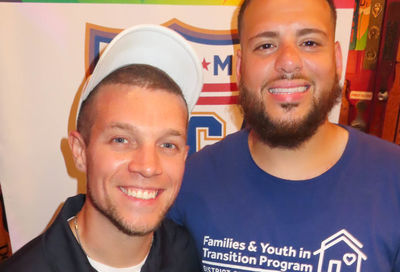An American Dream
Once a bipartisan bill, the DREAM Act's goal of integrating undocumented youth has become an uphill battle
Imagine this: Your parents bring you here at a young age and put you in school. You are asked to learn a new language while working hard to make the most of every opportunity. You grow up listening to Mighty Mouse, watching Glee, playing Pokemon on the latest version of Nintendo, eating hamburgers and fries, drinking the Dew (and subsequently dieting to fit into your latest American Apparel).
When you are in your senior year of high school and ready to apply to colleges, you cannot find an odd nine-digit number needed for the applications. That’s when your parents tell you that you don’t have one because you were brought here illegally. That, in fact, you are not really American. And you cannot simply go down to the immigration offices and sit for a test to rectify this transgression.
Without a social security number, most students can neither afford to attend college nor get a job. The ones who do make it through college find out that they cannot even work at McDonalds because they are not legally authorized to work in the United States. Left out and shut out, these American students — many of whom are star athletes, valedictorians, and aspiring military officials — have nowhere to turn and become part of a perpetual underclass living in the shadows of society.
That is where the DREAM Act comes into play. It fixes part of our immigration system to say that young, undocumented immigrants who were brought here before the age of 16, lived here continuously for the past five years and graduated with a high school diploma or GED must either attend two years of college or join the military in order to be eligible for citizenship in six years. That sounds fair enough, no?
The DREAM Act enjoyed tremendous bipartisan support when it was first introduced in 2001 but it is now caught up in the partisan gridlock of Congress and an American public that is increasingly hostile to undocumented immigrants. So it is nothing short of a miracle and maybe a carefully calculated political move that Senate Majority Leader Harry Reid has decided to bring it up with the National Defense Authorization Act.
It has taken almost three years of organizing since the DREAM Act failed to override a filibuster in 2007 to get back to the starting point for another vote. The hard work, passion and dedication of undocumented students to organize for this legislation cannot be understated. Organizing for the legislation has been like throwing pebbles into the sea and hoping the ripples spread far enough or transform into waves that reach the other side.
From doing sit-ins in Congressional offices around the country to fasting for weeks to challenging the leadership of the Congressional Hispanic Caucus, it is the grassroots activism of undocumented youth – many of whom are also queer — that has allowed this legislation to rise like the phoenix from the ashes of comprehensive immigration reform and now face the ultimate test of Congress.
I’m not sure whether we would prevail in the fight. But I’m confident that Dreamers — as DREAM Act eligible students are fondly call themselves — will keep fighting for their right to live and become productive citizens in the only place they call home.
Most of us don’t know how to live any other kind of life.
Prerna Lal co-founded DreamActivist.org and helped launch a program for immigrant youth in San Francisco Bay. She is a managing editor at The Sanctuary. She can be reached at .
Support Metro Weekly’s Journalism
These are challenging times for news organizations. And yet it’s crucial we stay active and provide vital resources and information to both our local readers and the world. So won’t you please take a moment and consider supporting Metro Weekly with a membership? For as little as $5 a month, you can help ensure Metro Weekly magazine and MetroWeekly.com remain free, viable resources as we provide the best, most diverse, culturally-resonant LGBTQ coverage in both the D.C. region and around the world. Memberships come with exclusive perks and discounts, your own personal digital delivery of each week’s magazine (and an archive), access to our Member's Lounge when it launches this fall, and exclusive members-only items like Metro Weekly Membership Mugs and Tote Bags! Check out all our membership levels here and please join us today!


















